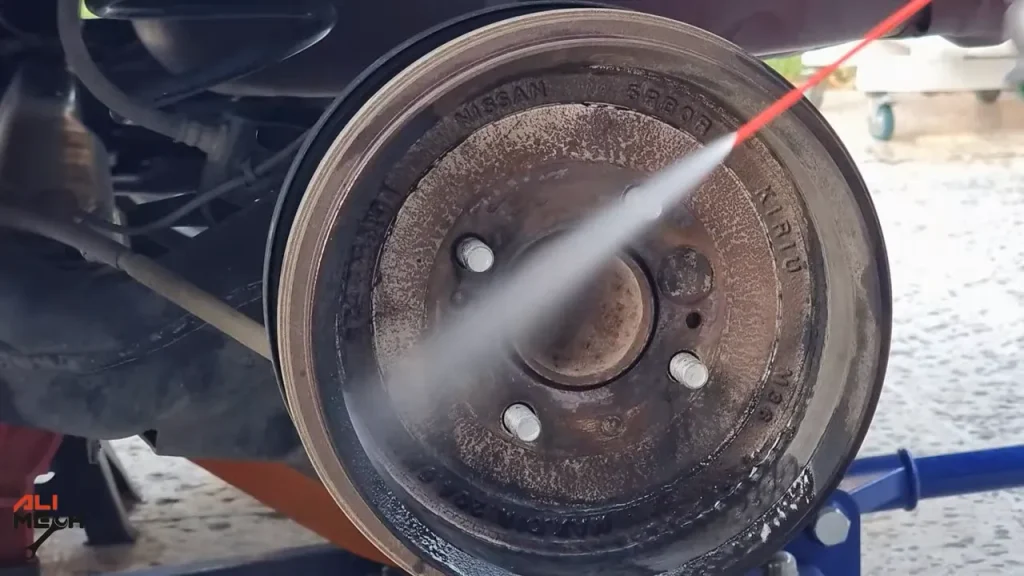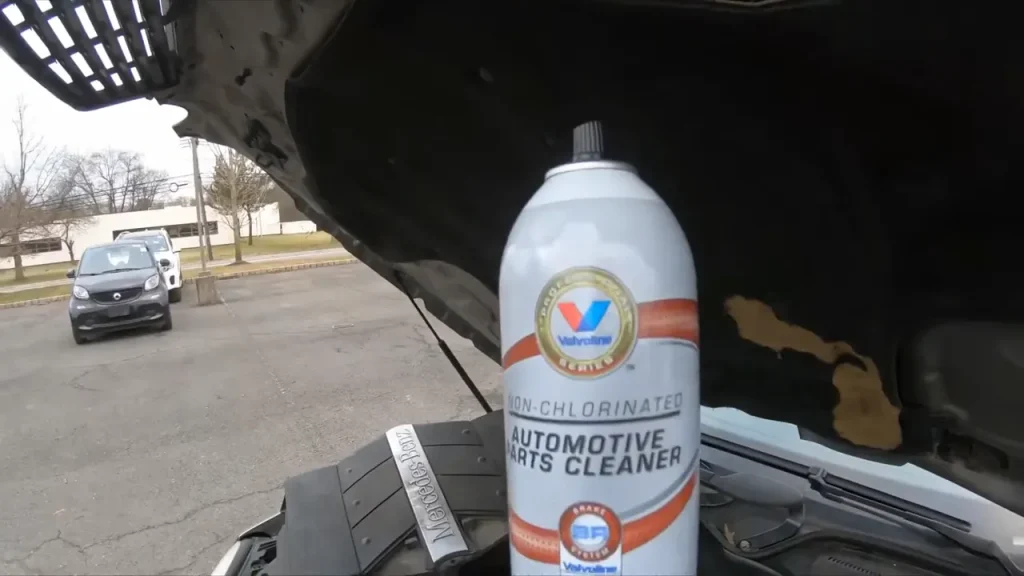Can You Use Brake Cleaner As Starting Fluid?(Surprising Truth)
Yes, brake cleaner can be used as a starting fluid due to its similar properties. Brake cleaner is a flammable solvent used to clean brake parts and can help start an engine by providing ignition for the fuel-air mixture.
However, it should be used with caution as it may not be as effective as a dedicated starting fluid and could potentially damage certain engine components. Before using brake cleaner as a starting fluid, it is important to consult the manufacturer’s recommendations and consider alternatives specifically designed for this purpose.
Understanding Brake Cleaner And Starting Fluid
Brake cleaner and starting fluid are two commonly used automotive products, but they serve different purposes. While they may seem similar at first glance, it is important to understand their distinctions to avoid any potential mishaps or damage to your vehicle.
In this section, we will explore the differences between brake cleaner and starting fluid and delve into the specific purposes they are designed for.
Differentiating Between Brake Cleaner And Starting Fluid
Brake cleaner:
- Designed specifically for cleaning brake components, such as pads, rotors, and calipers.
- Helps remove grease, oil, dirt, and other contaminants that can affect braking performance.
- Typically comes in aerosol cans with a powerful solvent formula to dissolve and flush away brake residues.
- Contains chemicals that are strong enough to remove brake dust and grime, but it should never be used as a starting fluid substitute in your engine.
Starting fluid:
- Intended to assist in starting engines, particularly in cold weather conditions when ignition may be difficult.
- Composed of volatile hydrocarbons that vaporize quickly, creating a flammable mist that aids in ignition.
- Usually comes in aerosol form for easy application, with a high concentration of ether or other suitable flammable liquids.
- It is crucial to note that starting fluid should only be used in the engine’s air intake system and never sprayed directly onto other components or used as a cleaning solution.
While both brake cleaner and starting fluid may come in aerosol cans and have similar packaging, their formulations and purposes differ significantly. Each product serves its own distinctive role and should not be used interchangeably. It is essential to use the correct product for its intended purpose to maintain the performance and safety of your vehicle.
The Science Behind Brake Cleaner And Starting Fluid
While brake cleaner and starting fluid are both used in automotive maintenance, they have different chemical compositions that affect their performance. Understanding these compositions is key to using them effectively and safely.
We will explore the chemical composition of brake cleaner and starting fluid, and how these compositions impact their effectiveness in different applications.
Chemical Composition Of Brake Cleaner:
Brake cleaner is primarily composed of the following chemicals:
- Acetone: This volatile solvent helps to dissolve and remove grease, oil, and other contaminants from brake parts. Acetone has a low boiling point, which allows it to evaporate quickly, leaving behind a clean surface.
- Toluene: Another important component of brake cleaner, toluene is a powerful solvent that effectively removes brake dust and grime. It also acts as a drying agent to speed up the evaporation process.
- Methyl ethyl ketone (mek): Mek is a strong solvent that breaks down tough deposits and residues on brake components. It helps to ensure a thorough cleaning by dissolving any remaining contaminants.
- Carbon dioxide (co2): Some brake cleaner formulations contain carbon dioxide as a propellant. Co2 is non-flammable and provides the necessary pressure to dispense the cleaner.

Chemical Composition Of Starting Fluid:
Starting fluid, commonly used to assist with starting gasoline engines, typically contains the following ingredients:
- Ether compounds: Starting fluid usually contains diethyl ether or a similar ether compound. These compounds are highly volatile and have low flash points, making them ideal for the quick ignition needed during engine startup.
- Petroleum distillates: Starting fluid may also contain petroleum distillates, such as heptane or hexane. These compounds provide additional flammability and aid in the combustion process.
- Lubricants: To protect the engine during startup, starting fluid formulations often include lubricants. These lubricants help reduce friction between moving parts until the engine’s oil circulation system takes over.
How These Compositions Affect Their Performance:
The chemical compositions of brake cleaner and starting fluid have a significant impact on their respective performances:
- Brake cleaner’s blend of solvents effectively cuts through brake dust, oil, and grime, ensuring optimal brake performance. Its quick evaporation leaves no residue behind, preventing potential contamination of brake pads, discs, and other components.
- Starting fluid’s volatile ether compounds provide a highly combustible mixture that aids in cold engine starts. By providing an easily ignitable source of fuel, starting fluid helps overcome issues like fuel system vapor lock or inadequate fuel delivery during startup.
Understanding the science behind brake cleaner and starting fluid is crucial for their proper usage. By appreciating their chemical compositions and how they affect performance, you can make informed decisions when using these products in automotive maintenance. Remember to follow safety guidelines and proper handling practices to ensure a safe and effective application.
So, next time you’re working on your brakes or struggling with a stubborn engine, you’ll have the knowledge to choose the right product for the job.

The Purpose And Benefits Of Brake Cleaner
If you’ve ever worked on your car’s brakes, you’re likely familiar with brake cleaner. It’s a versatile product commonly used by automotive enthusiasts and professionals alike. But what exactly is the purpose of brake cleaner, and what are the benefits it provides?
In this section, we’ll delve into the details, exploring the key reasons to use brake cleaner, from cleaning and degreasing brake components to enhancing brake system performance and safety.
Cleaning And Degreasing Brake Components
Brake cleaner is specifically designed to remove contaminants from brake components, ensuring they function optimally. Here are the key points regarding its role in cleaning and degreasing brake parts:
- Removes brake fluid: Brake fluid can leak or spill onto various components, leading to decreased performance. Brake cleaner effectively dissolves and removes brake fluid, preventing damage to the system.
- Eliminates dirt and grime: Brake components are exposed to environmental elements that can cause dirt and grime buildup. Brake cleaner cuts through this debris, restoring components to their original condition.
- Cleans brake dust: Brake dust is formed from friction between the brake pads and rotors. Over time, it accumulates on various parts of the braking system, potentially impeding its function. Brake cleaner helps remove brake dust, keeping the system clean and efficient.
Removing Dirt, Grime, And Brake Dust
Now that we’ve covered how brake cleaner cleans and degreases brake components, let’s focus on its ability to remove dirt, grime, and brake dust. Here are the key points to consider:
- Targets stubborn residue: Brake cleaner contains powerful solvents that effectively dissolve stubborn dirt, grime, and brake dust. This allows for easy removal and thorough cleaning of affected components.
- Penetrates hard-to-reach areas: Brake cleaner often comes in aerosol form, making it easy to spray into tight spots that are hard to reach manually. It reaches areas such as calipers, brake lines, and rotor surfaces, eradicating accumulated residue.
- Prevents corrosion: Dirt, grime, and brake dust can contribute to corrosion on brake components. Regular use of brake cleaner helps prevent corrosion, preserving the integrity and longevity of the brake system.
Enhancing Brake System Performance And Safety
One of the primary benefits of using brake cleaner is the resulting improvement in brake system performance and safety. Here’s what you need to know:
- Restores brake responsiveness: Brake components covered in dirt, grime, or brake dust may impede their ability to function optimally. By cleaning and removing these contaminants using brake cleaner, you can restore brake responsiveness, ensuring effective stopping power when needed.
- Reduces brake noise: Brake noise can be caused by the accumulation of brake dust or debris. Cleaning the components with brake cleaner helps reduce noise, providing a smoother and quieter braking experience.
- Safeguards against potential issues: Regular brake cleaning and maintenance with brake cleaner can help identify potential issues early on. By keeping the brake system clean, you can spot leaks, cracks, or other problems that may compromise safety, allowing for timely repairs.
Brake cleaner plays a crucial role in maintaining the cleanliness, performance, and safety of your vehicle’s brake system. Regular use helps clean and degrease brake components, removing dirt, grime, and brake dust. By doing so, it enhances brake system performance, restores responsiveness, reduces noise, and safeguards against potential issues.
Incorporating brake cleaner into your routine maintenance can contribute to a smoother and safer driving experience.

The Purpose And Benefits Of Starting Fluid
Assisting Cold Starts In Gasoline Engines
Starting a cold engine can be a challenge, especially during colder months or in regions with colder climates. Thankfully, starting fluid can come to the rescue by assisting in cold starts in gasoline engines. Here are some key points to consider:
- Starting fluid is designed specifically to assist in starting gasoline engines, providing an extra boost during cold starts.
- It contains highly flammable chemicals, such as ether or petroleum distillates, that have a low ignition temperature, making them easily combustible.
- When sprayed directly into the air intake or carburetor, starting fluid vaporizes quickly and mixes with the incoming air, creating a highly combustible mixture that aids in the ignition process.
- Since cold temperatures can affect the combustibility of fuel in the engine, starting fluid helps compensate for this by providing an additional fuel source that easily ignites in low temperatures.
- By using starting fluid, you can effectively overcome the initial challenges of starting a cold engine and improve the chances of a successful start.
Boosting Combustion During Low Temperatures
Combustion efficiency tends to be lower in colder temperatures, as the fuel-air mixture requires more energy to ignite. This is where starting fluid plays a crucial role in boosting combustion during low temperatures. Consider the following key points:
- Starting fluid contains highly volatile substances that have a low ignition temperature, allowing them to ignite more easily even in colder conditions.
- The addition of starting fluid to the engine’s air intake optimizes the air-fuel mixture, making it more combustible in low temperatures.
- The highly flammable nature of starting fluid ensures a quick and efficient combustion process, overcoming the challenges posed by cold weather conditions.
- By improving combustion efficiency, starting fluid helps ensure a smoother engine start and reduces the risk of misfires or stalling.
Increasing The Chances Of A Successful Engine Start
One of the primary benefits of starting fluid is its ability to increase the chances of a successful engine start, especially in situations where the engine is struggling to start. Here are the key points to consider:
- Starting fluid provides an additional fuel source that easily ignites, improving the chances of effectively starting the engine, even in challenging conditions.
- The highly flammable components of starting fluid create a more combustible air-fuel mixture, which enhances the ignition process and facilitates a successful start.
- In cases where the fuel system or carburetor is faulty or clogged, starting fluid can bypass these issues by directly entering the engine through the air intake, providing an alternative fuel source.
- Using starting fluid can save time and effort by eliminating the need for excessive cranking, which can strain the engine and drain the battery.
- However, it’s important to use starting fluid sparingly and according to the manufacturer’s instructions to prevent potential damage to the engine or other components.
Starting fluid serves as a valuable aid in assisting cold starts, boosting combustion during low temperatures, and increasing the chances of a successful engine start. Understanding its purpose and benefits can help optimize the starting process and ensure smoother engine performance, particularly in challenging conditions.
Remember to use starting fluid responsibly and follow the recommended guidelines for safe usage.
The Possible Risks Of Using Brake Cleaner As Starting Fluid
Understanding The Potential Dangers
Using brake cleaner as starting fluid might seem like a convenient solution, especially if you don’t have starting fluid readily available. However, it’s important to be aware of the potential risks associated with this practice. Here are some key points to consider:
- Brake cleaners typically contain chemicals such as acetone, toluene, and methanol, which are highly flammable. These chemicals are designed to be used on brake components, not as a starting aid for engines.
- The high flammability of brake cleaner makes it a safety hazard when used as starting fluid. There is an increased risk of fire or explosion, which can result in severe damage to both the vehicle and the people around it.
Effects Of Brake Cleaner On Engine Components
Using brake cleaner as a starting fluid can have detrimental effects on various engine components. It’s crucial to understand the potential consequences before resorting to this practice. Here’s what you need to know:
- Brake cleaner is not formulated for engine use, and its chemical composition can cause damage to sensitive engine parts. The chemicals in brake cleaner can corrode seals, gaskets, and rubber components within the engine, leading to leaks and potential engine failure.
- Spraying brake cleaner directly into the intake system can contaminate the air/fuel mixture and disrupt the combustion process. This can result in rough idling, misfires, decreased fuel efficiency, and even engine stalling.
Impact On Vehicle Performance And Longevity
Using brake cleaner as starting fluid can also have long-term implications for your vehicle’s performance and longevity. Here are some factors to consider:
- The corrosive nature of the chemicals in brake cleaner can lead to accelerated wear and tear on engine components. Over time, this can result in decreased performance, reduced power output, and increased maintenance costs.
- Continuous use of brake cleaner as starting fluid can cause a buildup of residue and deposits in the intake system and combustion chambers. These deposits can negatively affect engine efficiency and overall performance.
- The potential damage caused by using brake cleaner as starting fluid may void any warranties or insurance coverage on the vehicle. This can leave you unprotected in case of engine failure or damage.
Remember, it’s always best to use the proper starting fluid recommended by your vehicle’s manufacturer. Using brake cleaner as a substitute may seem like a quick fix, but the potential risks simply outweigh the benefits. Prioritizing your safety and the longevity of your vehicle should always be the top priority.
Why Brake Cleaner Should Not Be Used As Starting Fluid
Using the right starting fluid for engines in cold temperatures is crucial to ensure a smooth and reliable start. But can you use brake cleaner as starting fluid? In this section, we will discuss why brake cleaner should not be used as starting fluid and explore the differences in chemical composition and properties, potential damage to the engine and fuel system, as well as safer alternatives.
Differences In Chemical Composition And Properties
- Brake cleaner and starting fluid have different chemical compositions and properties, tailored for their respective purposes.
- Brake cleaner is designed to remove oil, grease, and other contaminants from brake parts, while starting fluid is formulated to aid in ignition and combustion during cold starts.
- Brake cleaner typically contains solvents like acetone, toluene, or xylene, which are not intended for combustion. On the other hand, starting fluid usually contains ether, a highly volatile compound that is easily combustible.
Potential Damage To The Engine And Fuel System
- Using brake cleaner as starting fluid can potentially damage the engine and fuel system due to its chemical composition.
- The solvents found in brake cleaner are not designed to be combusted, and using them in the engine can lead to incomplete combustion, engine misfires, or even engine damage.
- Brake cleaner may also leave behind residue that can clog fuel injectors or damage sensitive engine components, leading to costly repairs.
Safer Alternatives For Starting Engines In Cold Temperatures
- To ensure a safe and efficient cold start, it is recommended to use dedicated starting fluids or other alternatives instead of brake cleaner.
- One popular alternative is using an ether-based starting fluid specifically designed for this purpose.
- Ether-based starting fluids are formulated to evaporate quickly and aid in combustion, providing a reliable start in cold weather conditions.
- If an ether-based starting fluid is not available, using a small amount of gasoline or diesel fuel can also be an option. However, caution should be exercised to avoid excessive fuel introduction.
- It is important to follow the manufacturer’s instructions and guidelines when using any starting fluid to ensure safe and effective engine starting.
While brake cleaner may seem like a convenient substitute for starting fluid, it is not recommended due to differences in chemical composition and potential damage to the engine and fuel system. Opting for dedicated starting fluids or suitable alternatives ensures a safer and more reliable cold start for your engine.
Safe And Effective Alternatives To Starting Fluid
Exploring Alternative Methods For Cold Starts
Are you tired of relying on starting fluid to get your engine up and running in cold weather? Fortunately, there are safe and effective alternatives that can help you start your engine without the need for harsh chemicals. In this section, we will explore some alternative methods for cold starts that can ensure a smooth start even in freezing temperatures.
Using engine block heaters or electric fuel heaters:
- Engine block heaters: These devices are designed to warm up the engine block by using an electrical element. They provide a continuous heat source that warms the engine coolant, ensuring smoother starts in cold weather. Here’s why they are worth considering:
- Engine block heaters help prevent engine wear and tear by reducing friction during startup.
- They improve fuel efficiency by allowing the engine to reach optimal operating temperature faster.
- Engine block heaters are cost-effective and environmentally friendly, as they reduce the need for unnecessary fuel consumption during warm-up.
- Electric fuel heaters: Electric fuel heaters warm the fuel before it reaches the engine, ensuring that it is in a vaporized state, which is easier to ignite. Here’s why they can be a great alternative to starting fluid:
- Electric fuel heaters improve fuel atomization, promoting a more efficient combustion process.
- They help prevent fuel system problems that can occur in extremely cold temperatures, such as fuel line freeze-ups.
- Electric fuel heaters provide a consistent heat source to the fuel, ensuring a reliable start even in cold weather.
Preheating the engine before starting in extreme cold:
Preheating the engine before starting can be highly effective in extreme cold conditions. By allowing the engine to reach a slightly higher temperature before starting, you can reduce the strain on the battery and other components. Here’s how preheating can benefit you:
- It decreases the load on the battery, making it easier to start the engine.
- Preheating helps prevent unnecessary wear and tear on the engine and other moving parts.
- It minimizes the risk of damaging the starter motor due to excessive strain caused by cold, thick oil.
Remember, when using any alternative method for cold starts, it is important to follow the manufacturer’s instructions and guidelines. Additionally, ensure that all components and devices are in good working condition before relying on them in extreme temperatures. By exploring these alternative methods, you can bid farewell to the use of brake cleaner as starting fluid and ensure a safe and reliable start for your engine, no matter how cold it gets.
Conclusion
While brake cleaner and starting fluid may seem similar, it is important to understand that they are not interchangeable. Brake cleaner is specifically designed to clean brake components and should not be used as a substitute for starting fluid. While there are some similarities in their ingredients, starting fluid contains additional components that make it suitable for its intended purpose of aiding in engine ignition.
Using brake cleaner as starting fluid can lead to engine damage, poor performance, and potential safety risks. It is always best to use products as intended by the manufacturers to ensure optimal performance and safety. If you are experiencing difficulty starting your engine, it is recommended to consult a professional mechanic or refer to the manufacturer’s guidelines for the appropriate starting fluid to use.
- Why Are My Car Headlights Not Bright Enough? - May 9, 2024
- How Long Can You Drive With An EVAP Leak? - May 9, 2024
- What Does B Stand for in a Car? [Full Guide] - May 9, 2024




